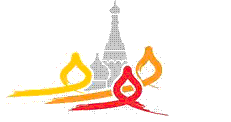Eastern European and Central Asian AIDS Conference |
РУССКИЙ ENGLISH |

Eastern European and Central Asian AIDS Conference
Moscow 15-17 May 2006
The 1st Eastern European and Central Asian AIDS conference - taking place in Moscow on 15-17 May 2006 - marks the first time all stakeholders involved in the fight against HIV/AIDS in the region will meet and share experiences and lessons learned.
Background
The idea of an Eastern European and Central Asian AIDS conference was first discussed during the International AIDS Conference in Bangkok 2004. The Federal Service for Supervision of Consumers Protection and Welfare in the Russian Federation, the United Nations Joint Programme on HIV/AIDS (UNAIDS), and the International AIDS Society (IAS) joined together to organise the first Eastern European and Central Asian AIDS Conference. The Russian NGO AIDS Infoshare was appointed the local host organisation for the 1st Eastern European and Central Asian AIDS Conference (EECAAC). The conference, expected to gather around 1500 delegates, will join the number of regional AIDS conferences which already take place in Europe, the Americas, Africa and Asia on a biennial basis.
Objectives
The main objective is to strengthen and consolidate a large-scale response to HIV/AIDS in the region through enhanced high-level political commitment and leadership, technical capacity building as well as partnerships with people living with HIV and civil society. An estimated 1.6 million people in the region are living with HIV in 2005 - a nearly twenty-fold increase in less than ten years.
The theme of the conference is Facing the Challenge, underlining that countries in Eastern Europe and Central Asia have an unprecedented opportunity to reverse the epidemic by scaling up efforts for prevention, care, treatment and support. The political will is gaining momentum at all levels with innovative partnerships emerging between governments, people living with HIV and civil society. There is a steep increase in international and domestic resources and a wealth of best practices from the region and around the world is becoming available. The conference will build from these positive developments and focus on meeting the challenges ahead.
The Eastern European and Central Asian AIDS conference will precede and help set the stage for three major global events which will determine the future of the international response to HIV/AIDS: the June 2006 UN General Assembly review of the Declaration of Commitment Against AIDS;, the July 2006 G8 Summit in Saint Petersburg, Russia which will include a focus on infectious diseases; and the 16th International AIDS Conference in August 2006 in Toronto. Thus the timing of the Eastern European and Central Asian AIDS conference will bring focus and attention to HIV/AIDS in the region and how challenges and opportunities are shared globally.
Expected outcomes
Like other major international conferences on HIV/AIDS, the meeting's work will be organised into three tracks encompassing leadership, scientific and community programmes. As such, the conference will provide a unique forum where policy makers, researchers, civil society representatives and people living with HIV from Eastern Europe and Central Asia can come together with international experts to address the particular characteristics of the HIV/AIDS epidemic in the region.
Many international organisations and bilateral donors, including The Global Fund to Fight AIDS, Tuberculosis and Malaria, the Swedish International Development Agency (Sida), the European Comission, the International AIDS Society, AIDS Foundation East West (AFEW), the World Bank, UNODC and UNAIDS, are supporting the conference.
The Conference Organising Committee is co-chaired by Gennady Onischenko, Head of the Federal Service for Surveillance of Consumer Rights Protection and Human Welfare of the Russian federation, Peter Piot, UNAIDS Executive Director, and Craig McCLure, Executive Director of the International AIDS Society.
Partnership, prevention and treatment are the main themes to be discussed during the conference. Most importantly, the conference will provide a unique and timely opportunity for organisations and individuals from across the region to share experiences and develop common approaches to the fight against HIV/AIDS at a time when the course of the epidemic can still be reversed.
Additional information and online registration forms can be found on www.eecaac2006.org
Conference key dates:
15 February 2006 Conference Registration opens. Poster presentation submissions, exhibition
requests and scholarship applications open. Thesis submission opens.
15 March 2006 End of thesis submission. Poster presentation submissions, exhibition requests
and scholarship applications close.
15 April 2006 Conference Registration ends.
15-17 May 2006 1st Eastern European and Central Asian AIDS Conference
| Conference programme | May 15 | May 16 | May 17 |
| 9.00-11.00 | Conference opening
Plenary session |
Plenary session | Plenary session |
| 11.00-11.30 | Break | Break | Break |
| 11.30-13.00 | Concurrent Task Groups
- Science and medicine - Political/civil leadership - Civil society |
Concurrent Task Groups
- Science and medicine - Political/civil leadership - Civil society |
Concurrent Task Groups
- Science and medicine - Political/civil leadership - Civil society |
| 13.00-15.00 | Lunch Break | Lunch Break | Lunch Break |
| 13.00-15.00 | Poster presentations | Poster presentations | Poster presentations |
| 13.00-15.00 | Practical seminars | Practical seminars | Practical seminars |
| 14.00-15.00 | СSatellite events | Satellite events | Satellite events |
| 15.00-16.30 | Break | Break | Break |
| 15.00-17.00 | Poster Discussions | Poster Discussions | Poster Discussions |
| 17.00-17.30 | Break | Break | Break |
| 17.30-18.30 | Satellite Linkup | Satellite Linkup | Satellite Linkup |
| 9.00-19.00 | Exhibition of NGOs, donors and commercial companies | Exhibition of NGOs, donors and commercial companies | Exhibition of NGOs, donors and commercial companies |


